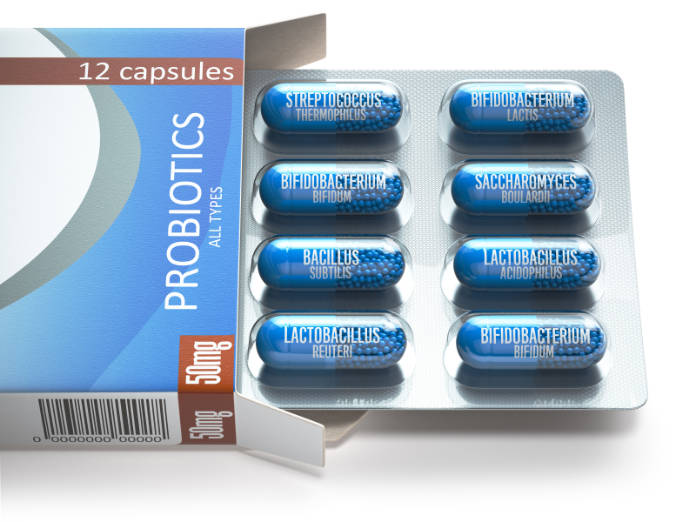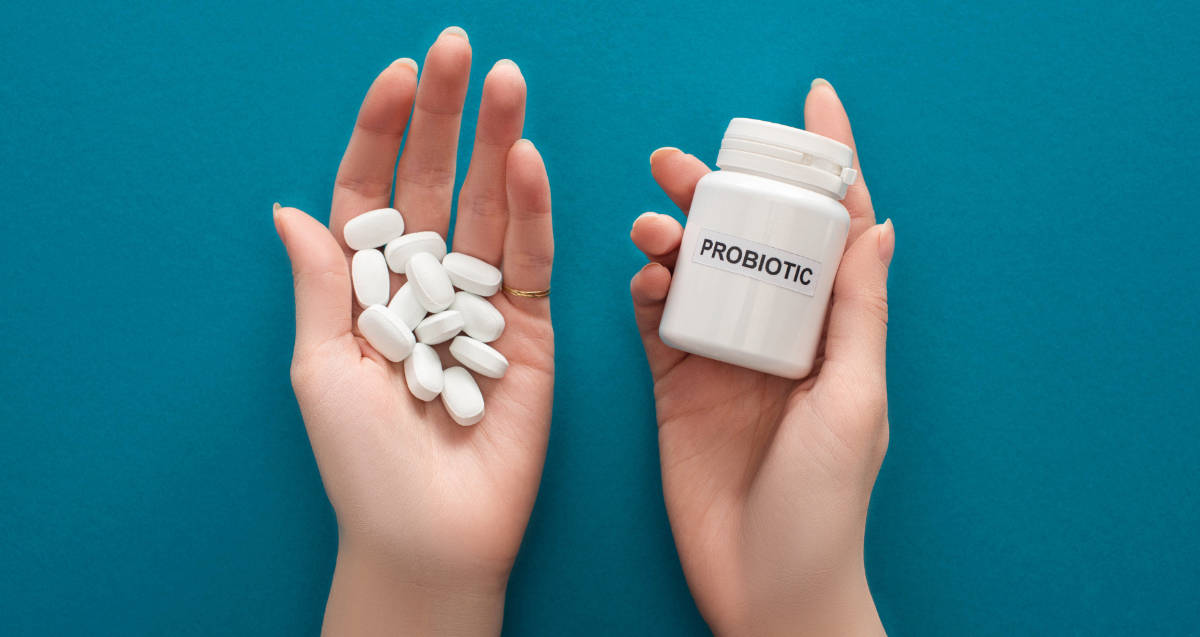Our guts are full of bacteria, both good and bad. A stable mix of these bacteria – called the microbiome – is essential to a healthy digestive system and overall wellbeing. Probiotics is the name given to beneficial bacteria, and supplements are especially good for individuals who have an imbalance of bacteria in their guts from illnesses like Irritable Bowel Syndrome (IBS). Probiotic supplements can help ease symptoms and restore the natural balance of bacteria – helping to improve digestion and to fight bad bacteria.
What are probiotics
Probiotics are good bacteria that we need to help keep the natural balance in our bodies. Our guts are full of helpful and harmful bacteria that help us digest food and keep our bodies and immune systems functioning. Probiotics inhibit the growth of more harmful bacteria and encourage the growth of the good, helpful bacteria to modulate our immune system. Research indicates that stabilising our gut microbiome positively affects many of the body’s other functions, moods and behaviours – with the gut often dubbed ‘the second brain‘.
Probiotics naturally occur in many foods. A healthy diet incorporating these foods will help boost your gut health and overall immune system. Probiotic foods include:
- Yoghurt – Made from fermented milk, yoghurt is one of the best sources of probiotics.
- Kefir – Like yoghurt, kefir is fermented milk made from kefir grains (a balance of bacteria, yeast, and enzymes).
- Tempeh – Cooked and fermented soybeans that boost the concentration of good bacteria.
- Kimchi – Made of mostly fermented cabbage and a mixture of pickled vegetables, this Korean dish contains plenty of gut-friendly bacteria.
- Kombucha – This drink originates from China and is made from a sweetened, fermented black tea full of good bacteria.
- Miso – An Asian paste made from fermented soy, containing large amounts of good bacteria.
- Sauerkraut – Fermented cabbage packed with live bacteria.
If you can’t eat dairy, kefir and yoghurt can be made with plant-based milk like coconut or almond.
The gut microbiome varies from individual to individual, with some people needing more probiotics than others due to an imbalance. If you suffer from any gut health-related issues, taking probiotic supplements may help ease symptoms.
Signs you may want to consider a probiotic supplement:
- Bloating can indicate that the bacteria in your gut is out of balance.
- Gassy – excessive flatulence is a sign your gut is imbalanced, and there are more bad bacteria than good. This could also be a sign of food intolerance like dairy or gluten.
- Diarrhoea – if not caused by food poisoning, diarrhoea is another sign you have a gut imbalance.
- Constipation – noticing that you’re not as regular as you should be could indicate a need for probiotics. Fluctuating between constipation and diarrhoea is common in IBS sufferers.
- Recurrent yeast infections – can arise from a lack of good gut bacteria. Urinary tract infections can also signify the need for probiotics.
What are probiotic supplements?
Probiotic supplements are a way of providing extra, beneficial bacteria to the gut. For people who have gut issues, where a healthy, probiotic-rich diet isn’t helping, supplements are an easy way to get your gut balance back on track. Probiotic supplements contain live bacteria. Once ingested, the number of helpful bacteria in the gut increases, helping to balance the microbiome. By deterring the bad bacteria, the gut can maintain the right acidity to encourage gut health.

Probiotic supplements are generally considered safe. As probiotic bacteria already exist in the body naturally, supplement ingredients aren’t usually something to worry about. However, they don’t undergo rigorous testing because they’re classed as food rather than medicine. They may trigger certain allergic reactions or cause mild symptoms like bloating, stomach upset, and flatulence when you first start taking the supplements. When choosing supplements, keep in mind any allergies and aim for ones avoiding them, such as dairy-free supplements.
How to choose a probiotic supplement
Certain probiotic supplements may help with one symptom but not alleviate others. Before taking any supplements, consider talking to your doctor. They may perform tests to see if there are any serious underlying conditions.
Best sources of probiotic supplement
Probiotic supplements come in various forms – most commonly liquid, powder and capsules. Some research suggests that liquid supplements are the best form of a probiotic supplement because bacteria have a better chance of surviving in the gut if it is already live. Probiotic liquids have active bacteria that work immediately when taken. Some capsule and powder forms can take up to six hours to start acting in the gut.
The best probiotic supplements
There are a variety of supplements to suit different needs. The best source of probiotic supplements is based on the individual; there is no one-size-fits all treatment.
For complete recovery
If you’re interested in promoting gut, brain and sleep health, this complete 5-day recovery pack from The Good Mood Co is ideal. Each pack contains:
- 5 doses of Good Morning – All About The Gut act as a powerful energiser, improving immunity and acting as a probiotic, prebiotic and natural collagen booster. Take one capsule before breakfast.
- 5 doses of Brain Bottoms-Up – All About The Brain focuses on brain recovery by working on mental functions like memory, mood and focus. Take one capsule after breakfast.
- 5 doses of Good Night – All About Sleep promote a good quality of sleep, reduction in stress and added relaxation. It is also full of anti-oxidants to normalise the function of the nervous system. Take one capsule 1 hour before bed.
These supplements come in capsule form and are plant-based, gluten-free, sugar-free, dairy-free and soy-free, making them suitable for those with allergies and dietary requirements.
5 day pack – £13.59. Each supplement can be purchased separately – £12.99 for a 10 day pack.
Vegan-friendly
If you need a vegan-friendly supplement, these Pro 5 capsules from healthspan are lactose and gelatin-free and are suitable for vegetarians and vegans. They contain five billion live bacteria, with added B12 vitamins to support your immune health. B12 has proven advantages in reducing fatigue and stabilising metabolism.
Take one to two capsules with water daily. Can be taken simultaneously or divided throughout the day (i.e. one in the morning and one in the evening).
90 capsules – £16.45
Excipient, binder and filler-free
The Saccharomyces Boulardii capsules from G&G Vitamins are a natural probiotic yeast supplement used to promote gut health. Each capsule contains 8 billion viable organisms and a generous measure of L-Glutamine too.
L-Glutamine is used in the production of a healthy gut lining. Together the two active ingredients may reduce gut inflammation support membrane repair and reduce other unpleasant gastrointestinal symptoms.
Suitable for vegans, these all-natural capsules are free from binders, fillers and excipients and only contain the active ingredients in a vegetable cellulose shell.
You only need to take 1 capsule per day, with a 60-day supply costing a mere £24.90 or 42 pence per day.
Frequently asked questions
Do probiotic supplements survive stomach acid?
The stomach can be a harsh environment for supplements. For the live bacteria to colonise and benefit the gut, they must pass through the stomach alive. Some bacteria, including Lactobacillus, Bifidobacterium and Streptococcus, can survive stomach acid. Others may need to be taken with an enteric coating to act as a shield.
Who should take probiotic supplements?
There are different supplements for different needs, so look carefully at individual labels to find the best probiotic supplement to suit individuals. Some probiotic supplements aren’t suitable for children, so always read the label. Many brands will have child-friendly supplements, usually in a safe gummy form.
Individuals with serious medical conditions such as pancreatitis or who are severely immunosuppressed should avoid taking probiotic supplements. Always consult with a doctor if you have any conditions and if you are pregnant or breastfeeding.
Can you overdose on probiotic supplements?
It is not possible to overdose on probiotic supplements. Taking too many or increasing the dosage is generally safe, although may cause some symptoms like bloating or gas.
How often should I take a probiotic supplement?
Always read the label for the individual supplement advice. It is safe to take the recommended dose daily before eating your first meal, but this will be different depending on the supplement.
Best-selling probiotic supplements
Check out our list of best-selling probiotic supplements on Amazon.
- BIO CULTURES COMPLEX WITH 20 PROBIOTICS STRAINS: Our advanced probiotic complex contains 20 extensively researched natural bacteria strains that help balance gut flora for optimal digestive and gut...
- PREBIOTICS FOR GUT HEALTH & INTESTINAL FLORA: While most competitors offer only 100g inulin prebiotic powder, our prebiotic and probiotic supplements contain 200g of organic prebiotic inulin powder &...
- DEVELOPED FOR ENHANCED ABSORPTION:In most probiotic supplements, the bacterial strains come in low-quality capsules that quickly dissolve in stomach acid and never reach the intestines. Our pre and...
- 2 BILLION CFU PREMIUM PROBIOTICS SUPPLEMENT - New Leaf Probiotics contains 2 Billion CFU of acidophilus probiotic per serving of 2 tablets daily. The CFU content may seem lower than other brands,...
- PROBIOTICS FOR WOMEN & MEN – Probiotics is used for digestion and gut health. Our probiotic tablets are 100% vegan and gluten free, too. People with dietary restrictions can take them daily as gut...
- NO REFRIGERATION REQUIRED: Our Acidophilus probiotic is 100% shelf life stable, and provides ‘live’ bacteria until its long expiry date. We frequently manufacture fresh batches to ensure you...
- ✔ VEGAN FRIENDLY PROBIOTICS - Our easy to swallow capsules are filled with high quality viable bacteria at 6 Billion CFU per capsule and a 5 strain complex, you can be sure that you are taking...
- ✔ CONTAINS 5 BACTERIAL STRAINS – This probiotic supplement contains key bacteria strains, including Lactobacillus acidophilus, lactobacillus rhamnosus and Bifidobacterium bifidum. Each capsule...
- ✔ HOW TO TAKE OUR SUPPLEMENT? – For the most effective results, we recommend taking 1 capsule per day. The capsules have been designed to be easy to swallow, to be taken with water, a healthy...
- DAILY DIGESTIVE SUPPLEMENT: Did you know up to 70% of your immune system can be found in the gut?* Optibac Probiotics are scientifically proven to reach your gut alive to complement your natural gut...
- 5 BILLION CFU: Optibac guarantees 5 billion live probiotic bacteria in every capsule
- 6 STRAIN FORMULATION: contains extensively researched Lactobacillus, Bifidobacterium and Lactococcus strains, scientifically proven to reach the gut alive
- WITH 16 LIVE STRAINS - Our special pro biotics formulation has 16 effective strains designed to closely replicate the delicate flora of the digestive system. Contains the extensively researched...
- 30 BILLION CFU. SHELF STABLE: NutriZing guarantees 30 billion live bacterial cultures per serving, designed to last until the end of shelf life
- BETTER BOWEL PERFORMANCE: Your gut microbiome is the blueprint for your well-being, and our VEGAN TIME RELEASE CAPSULES disintegrate at exactly the right time to maximise absorption in the intestine...
- ✔ MAXIMUM STRENGTH 45 BILLION CFU: Each serving contains 45 Billion Live CFUs plus Prebiotics, up to 5 times the strength of some competitors and one of the highest strength multi strain Bio...
- ✔ 17 POTENT HEALTHY PROBIOTIC STRAINS, PLUS PREBIOTICS - Our easy to swallow daily bio cultures contain a unique blend of 17 potent strains of the Highest quality viable organisms including...
- ✔ NO MISLEADING SOURCE POWDER CLAIMS - Our Bio Cultures Complex provides 45 Billion CFUs per serving also described as 45 Billion viable organisms per serving. Other suppliers intentionally mislead...
- Bio-Kult contains 14 strains of live bacteria to complement the existing gut flora naturally present in a healthy person’s digestive system
- Microorganisms present in the intestine, collectively called the gut microbiota, are essential to health
- Includes Lactobacillus acidophilus, Bifidobacterium longum, Bacillus subtilis and 11 more l
Last update on 2024-03-29 / Affiliate links / Images from Amazon Product Advertising API
You may be interested in…
This article may include affiliate links to products and services where we may receive a small fee to support the running of this site if you make a purchase or is a sponsored article from one of our select editorial partners providing valuable advice and information to our readers.














































































